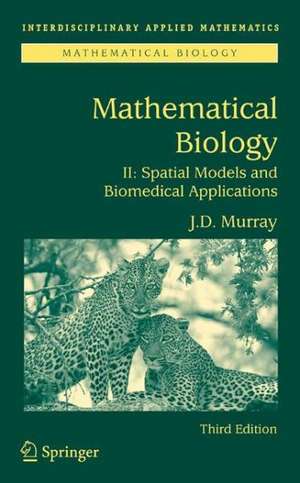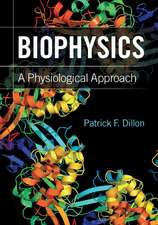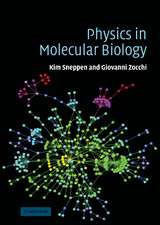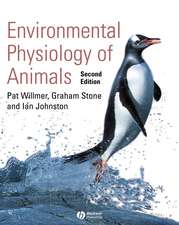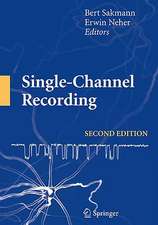Mathematical Biology II: Spatial Models and Biomedical Applications: Interdisciplinary Applied Mathematics, cartea 18
Autor James D. Murrayen Limba Engleză Paperback – 22 mai 2013
Due to the tremendous development in recent years, this new edition is being published in two volumes. This second volume covers spatial models and biomedical applications. For this new edition, Murray covers certain items in depth, introducing new applications such as modelling growth and control of brain tumours, bacterial patterns, wound healing and wolf territoriality. In other areas, he discusses basic modelling concepts and provides further references as needed. He also provides even closer links between models and experimental data throughout the text.
Graduate students and researchers will find this book invaluable as it gives an excellent background from which to begin genuinely practical interdisciplinary research in the biomedical sciences.
| Toate formatele și edițiile | Preț | Express |
|---|---|---|
| Paperback (1) | 667.05 lei 43-57 zile | |
| Springer – 22 mai 2013 | 667.05 lei 43-57 zile | |
| Hardback (1) | 761.00 lei 22-36 zile | +50.40 lei 6-12 zile |
| Springer – 27 ian 2003 | 761.00 lei 22-36 zile | +50.40 lei 6-12 zile |
Din seria Interdisciplinary Applied Mathematics
- 15%
 Preț: 487.25 lei
Preț: 487.25 lei - 20%
 Preț: 664.77 lei
Preț: 664.77 lei - 15%
 Preț: 980.97 lei
Preț: 980.97 lei - 17%
 Preț: 528.45 lei
Preț: 528.45 lei - 9%
 Preț: 630.35 lei
Preț: 630.35 lei - 18%
 Preț: 908.71 lei
Preț: 908.71 lei - 18%
 Preț: 1006.38 lei
Preț: 1006.38 lei - 15%
 Preț: 659.67 lei
Preț: 659.67 lei -
 Preț: 498.14 lei
Preț: 498.14 lei -
 Preț: 528.35 lei
Preț: 528.35 lei - 15%
 Preț: 659.02 lei
Preț: 659.02 lei - 15%
 Preț: 480.52 lei
Preț: 480.52 lei -
 Preț: 390.63 lei
Preț: 390.63 lei - 18%
 Preț: 918.61 lei
Preț: 918.61 lei -
 Preț: 388.52 lei
Preț: 388.52 lei - 15%
 Preț: 647.92 lei
Preț: 647.92 lei - 15%
 Preț: 655.60 lei
Preț: 655.60 lei - 23%
 Preț: 734.81 lei
Preț: 734.81 lei - 15%
 Preț: 660.83 lei
Preț: 660.83 lei - 18%
 Preț: 967.08 lei
Preț: 967.08 lei -
 Preț: 809.10 lei
Preț: 809.10 lei -
 Preț: 403.91 lei
Preț: 403.91 lei - 18%
 Preț: 896.84 lei
Preț: 896.84 lei - 18%
 Preț: 1004.00 lei
Preț: 1004.00 lei - 18%
 Preț: 974.19 lei
Preț: 974.19 lei -
 Preț: 399.67 lei
Preț: 399.67 lei - 23%
 Preț: 639.30 lei
Preț: 639.30 lei
Preț: 667.05 lei
Preț vechi: 784.77 lei
-15% Nou
Puncte Express: 1001
Preț estimativ în valută:
127.68€ • 138.74$ • 107.32£
127.68€ • 138.74$ • 107.32£
Carte tipărită la comandă
Livrare economică 21 aprilie-05 mai
Preluare comenzi: 021 569.72.76
Specificații
ISBN-13: 9781475778700
ISBN-10: 1475778708
Pagini: 844
Ilustrații: XXV, 814 p.
Dimensiuni: 155 x 235 x 48 mm
Greutate: 1.16 kg
Ediția:3rd ed. 2003. Softcover reprint of the original 3rd ed. 2003
Editura: Springer
Colecția Springer
Seria Interdisciplinary Applied Mathematics
Locul publicării:New York, NY, United States
ISBN-10: 1475778708
Pagini: 844
Ilustrații: XXV, 814 p.
Dimensiuni: 155 x 235 x 48 mm
Greutate: 1.16 kg
Ediția:3rd ed. 2003. Softcover reprint of the original 3rd ed. 2003
Editura: Springer
Colecția Springer
Seria Interdisciplinary Applied Mathematics
Locul publicării:New York, NY, United States
Public țintă
ResearchCuprins
Multi-Species Waves and Practical Applications.- Spatial Pattern Formation with Reaction Diffusion Systems.- Animal Coat Patterns and Other Practical Applications of Reaction Diffusion Mechanisms.- Pattern Formation on Growing Domains: Alligators and Snakes.- Bacterial Patterns and Chemotaxis.- Mechanical Theory for Generating Pattern and Form in Development.- Evolution, Morphogenetic Laws, Developmental Constraints and Teratologies.- A Mechanical Theory of Vascular Network Formation.- Epidermal Wound Healing.- Dermal Wound Healing.- Growth and Control of Brain Tumours.- Neural Models of Pattern Formation.- Geographic Spread and Control of Epidemics.- Wolf Territoriality, Wolf-Deer Interaction and Survival.
Recenzii
From the reviews:
"The 2nd volume of the authors elucidating work highlights a surprisingly broad spectrum of applications in the field of mathematical biology. The sense given to the mathematical texture of thoughts broadens the reader’s insight … . The growing number of specialists in sub-disciplines of mathematical biology will be enjoying the truly concise approach … . It can so be said that the foremost results … might be essential for new interpretations of data … . It is a recommended text for mathematicians … ." (Daniel Gertsch, Bioworld, Issue 2, 2004)
From the reviews of the third edition:
"This is the second volume of the third edition of Murray’s ‘Mathematical Biology’. … covers a wide variety of problems in pattern formation, each discussed in its biological context. … This volume alone is a large book, with more than 800 pages and a similar number of references. … it is a valuable collection of results from different areas of mathematical biology." (Carlo Laing, New Zealand Mathematical Society Newsletter, Issue 90, April, 2004)
"This book, a classical text in mathematical biology, cleverly combines mathematical tools with subject area sciences. The multi-layer way of material presentation makes the book useful for different types of reader including graduate-level students, bioscientists … . it is an enjoyable reading and I recommend it to anyone with serious interest in mathematical modelling." (V.V. Fedorov, Short Book Reviews, Vol. 23 (3), 2003)
"This second volume of the third edition of Murray’s Mathematical biology focuses on partial differential equations (spatial models) and their application to the biomedical sciences. … Each chapter deals with its particular topic in great detail, usually focusing on one biological example and the associated mathematical model and results. This volume is not an introductory text … making it extremely useful in graduate courses and for reference." (Trachette L. Jackson, Mathematical Reviews, 2004b)
"In this second volume … the development towards specific biological configurations and towards a mechanism for understanding morphogenesis represents an important portion of the work. … chapters deal with attractive topics … . There is an extensive index at the end. … very interesting and strongly recommended." (A. Akutowicz, Zentralblatt MATH, Vol. 1006, 2003)
"In this volume it becomes clear that compiling the third edition was a ‘labor of love’. The book has a significantly different feel from the original first edition. … my reaction to the third edition was positive. … The historical and biological overviews have much interesting information. … Certainly, the spicy writing will keep students alert … . In summary, I recommend the new and expanded third edition to any serious young student interested in mathematical biology … ." (Leah Edelstein-Keshet, SIAM Review, Vol. 46 (1), 2004)
"Mathematical Biology would be eminently suitable as a text for a final year undergraduate or postgraduate course in mathematical biology … . It is also a good source of examples for courses in mathematical methods … . Mathematical Biology provides a good way into the field and a useful reference for those of us already there. It may attract more mathematicians to work in biology by showing them that there is real work to be done." (Peter Saunders, The Mathematical Gazette, Vol. 90 (518), 2006)
"The 2nd volume of the authors elucidating work highlights a surprisingly broad spectrum of applications in the field of mathematical biology. The sense given to the mathematical texture of thoughts broadens the reader’s insight … . The growing number of specialists in sub-disciplines of mathematical biology will be enjoying the truly concise approach … . It can so be said that the foremost results … might be essential for new interpretations of data … . It is a recommended text for mathematicians … ." (Daniel Gertsch, Bioworld, Issue 2, 2004)
From the reviews of the third edition:
"This is the second volume of the third edition of Murray’s ‘Mathematical Biology’. … covers a wide variety of problems in pattern formation, each discussed in its biological context. … This volume alone is a large book, with more than 800 pages and a similar number of references. … it is a valuable collection of results from different areas of mathematical biology." (Carlo Laing, New Zealand Mathematical Society Newsletter, Issue 90, April, 2004)
"This book, a classical text in mathematical biology, cleverly combines mathematical tools with subject area sciences. The multi-layer way of material presentation makes the book useful for different types of reader including graduate-level students, bioscientists … . it is an enjoyable reading and I recommend it to anyone with serious interest in mathematical modelling." (V.V. Fedorov, Short Book Reviews, Vol. 23 (3), 2003)
"This second volume of the third edition of Murray’s Mathematical biology focuses on partial differential equations (spatial models) and their application to the biomedical sciences. … Each chapter deals with its particular topic in great detail, usually focusing on one biological example and the associated mathematical model and results. This volume is not an introductory text … making it extremely useful in graduate courses and for reference." (Trachette L. Jackson, Mathematical Reviews, 2004b)
"In this second volume … the development towards specific biological configurations and towards a mechanism for understanding morphogenesis represents an important portion of the work. … chapters deal with attractive topics … . There is an extensive index at the end. … very interesting and strongly recommended." (A. Akutowicz, Zentralblatt MATH, Vol. 1006, 2003)
"In this volume it becomes clear that compiling the third edition was a ‘labor of love’. The book has a significantly different feel from the original first edition. … my reaction to the third edition was positive. … The historical and biological overviews have much interesting information. … Certainly, the spicy writing will keep students alert … . In summary, I recommend the new and expanded third edition to any serious young student interested in mathematical biology … ." (Leah Edelstein-Keshet, SIAM Review, Vol. 46 (1), 2004)
"Mathematical Biology would be eminently suitable as a text for a final year undergraduate or postgraduate course in mathematical biology … . It is also a good source of examples for courses in mathematical methods … . Mathematical Biology provides a good way into the field and a useful reference for those of us already there. It may attract more mathematicians to work in biology by showing them that there is real work to be done." (Peter Saunders, The Mathematical Gazette, Vol. 90 (518), 2006)
Caracteristici
Includes supplementary material: sn.pub/extras
